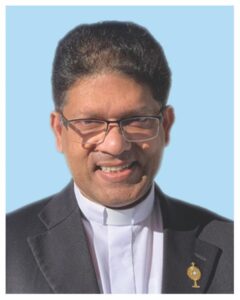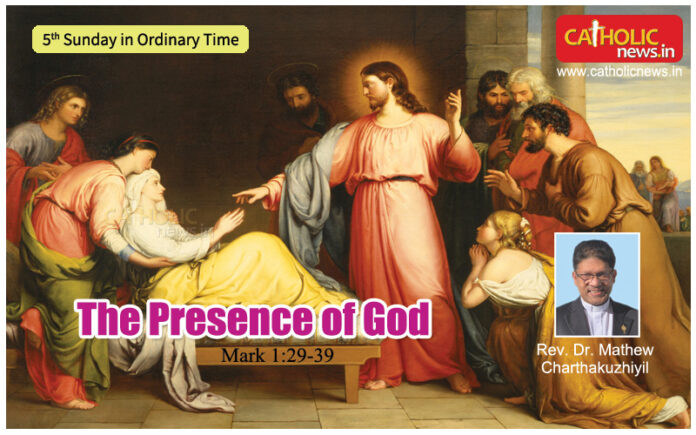
The Gospel reading records three events connected to the life of Jesus in Capernaum. The first one happens during the day that Jesus cures the mother-in-law of Simon Peter. The second one is in the evening when many sick people of the village come to Jesus for a cure. The third is Jesus waking up early in the morning and then going to a deserted place to pray and then going to other villages to preach the gospel.
Capernaum is a fishing village on the banks of the Sea of Galilee. It is a favorite place for Jesus, as it is the hometown of some of his disciples. The healing of the mother-in-law of Peter and ministering to the various spiritual and material needs of the people reveal the nature of the ministry of Jesus. Jesus is always available to the people, especially to the sick, the abandoned, and the lonely. He embraces them and tries to alleviate their suffering. Miracles are the signs that God is present among the human beings. The absence of God’s active presence in our lives can be a cause of our suffering. It also means that we fully understand this mystery related to life and suffering only if we understand the workings of God.
We are the disciples of Christ, and our lives are the extension of the ministry of Jesus. God continues to touch and heal people through our human hands. If healing were the sign that Jesus was present there, it can happen today through the presence of people who are filled with the spirit of Jesus. Jesus continues to heal many people in this broken world through our touch, words, and deeds. It is also through the presence of these ordinary people around us that we continue to see God’s presence in our lives.
“Where Love Is, God Is” is a short story about a shoemaker named Martin Avdeitch by the famous Russian writer Leo Tolstoy. He is an honest and hard-working shoemaker who lives in the basement of a building. His room has only one window, from where he sees only the feet of the people passing by. He can recognize most of the people by their shoes since he worked on them. He lost his wife and children and in his great grief, he abandoned God. One day, a missionary visited Martin and told him to live for God and read the Bible every day. As he began to read the Gospels, his life became full of peace and joy. One night, Martin reads a passage about a Pharisee who invites Jesus into his house, where a woman anoints and washes Jesus’ feet with her tears. Martin compares himself with the Pharisee and realizes that he is only living for himself. As Martin sleeps that night, God whispers in his ears: “I will come.”
The next morning, Martin skeptically looks out from his window for God. While Martin sees Stepanitch shoveling away snow, he invites him in for a warm drink, and they talk for a while. After some time, Martin sees a young woman outside with a baby, shivering in the cold. He invites her in for some food and gives her warm clothes and money. As he continues his work, Martin sees a young boy quarreling with an old lady. He intervenes and settles their argument and extends his love to them. That night, he becomes sad that God has not visited him during the day as promised. Again, in his sleep, the three people whom he helped appear to him. Then he hears the voice: “Martin, don’t you know me?” These people tell him that when he helped them, he was helping God.
We should open our hearts and minds to the people around us, and thus Jesus can intervene in our lives. In the same way, we should allow Jesus to touch and heal us from everything tormenting us. Let the lonely, abandoned, and sick people around us experience God’s healing through our touch also. Let the love of God be extended and transmitted to many people through our presence and prayers.
Rev. Dr. Mathew Charthakuzhiyil



